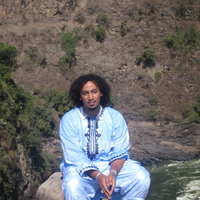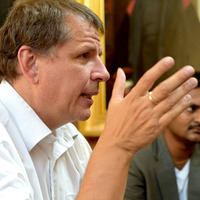Articles by Michael B Bishku
Journal of Global South Studies, 2024
The Conversation Africa, 2024

Sociology of Islam, 2024
Senegal is a country that values diplomacy. It is a predominantly-Muslim populated, constitutiona... more Senegal is a country that values diplomacy. It is a predominantly-Muslim populated, constitutionally secular, nonaligned state having relations with most countries in the world. Senegal has maintained a stable political system with peaceful transfers of power despite being located in a region of Africa witnessing unstable conditions in recent years. Its leadership is well regarded by countries with different political systems and through that reputation has been able to receive needed technical and economic assistance while maintaining an independent foreign policy. Senegal has exercised influence on the continent, and even beyond, greater than a number of African countries larger in size, since its independence from France in June 1960. Therefore, it has attracted the attention of outside powers, including those in the Middle East of middle size. Those countries, namely Saudi Arabia (together with Morocco and its allies in the Gulf), Türkiye, Iran and Israel, have regarded Senegal as a "gateway" to West Africa and the Sahel region. Yet while Senegal's ties especially with France and its neighbors in Africa have received much scholarly attention, academics have only recently begun to investigate Senegal's connections with the Middle East; it is indeed one important aspect for anyone wishing to study Senegal's foreign relations in a more comprehensive fashion and to have a better understanding of how this country is quite successful in balancing those ties.
Middle East Quarterly, 2024
IOL (South Africa), 2022
Turkey on the continent of Africa
The Conversation Africa, 2023
Journal of South Asian and Middle Eastern Studies, 2024
in Georgia. He has published numerous articles on Middle Eastern diplomatic history, politics, an... more in Georgia. He has published numerous articles on Middle Eastern diplomatic history, politics, and international relations, especially regarding Turkey and Israel as well as minorities and relations with other areas of the Global South. He is the former President of both the Association of Global South Studies and of the American Council for the Study of Islamic Societies.

Contemporary Review of the Middle East, 2023
During the Cold War, three countries were partitioned into two states: Germany, Korea, and Vietna... more During the Cold War, three countries were partitioned into two states: Germany, Korea, and Vietnam. The last was a result of its war of independence against the French following World War II and continued until 1954. Following a victorious war against the United States-backed government in the south, the communist government in the north reunited the country between 1975 and 1976. In 1988, facing economic troubles, Vietnam instituted Doi Moi market reforms while relaxing its ideological worldview and expanded its diplomatic and economic relations. In 1995, Vietnam joined the Association of Southeast Asian Nations (ASEAN), which it had regarded as a pro-Western organization during the Cold War. Meanwhile, first North Vietnam and later a reunified Vietnam went from a country whose relations were exclusive with states in the communist bloc and a few other non-aligned countries to one that today has ties with almost every country in the world. Academic studies on Vietnam's foreign relations largely focus on those with Russia, China, the US, its ASEAN partners, and other countries in Asia. However, since the end of the Cold War, countries of the Middle East and North Africa (MENA) region are an import source of Vietnam's crude oil and natural gas and an expanding market for its exports, while MENA states, in this era of globalization, have sought to increase diplomatic and economic ties throughout Asia.
Middle East Quarterly, 2023
Journal of South Asian and Middle Eastern Studies, 2023
Contemporary Review of the Middle East, 2022
Middle East Institute, 2022
Contemporary Review of the Middle East, 2022











Uploads
Articles by Michael B Bishku